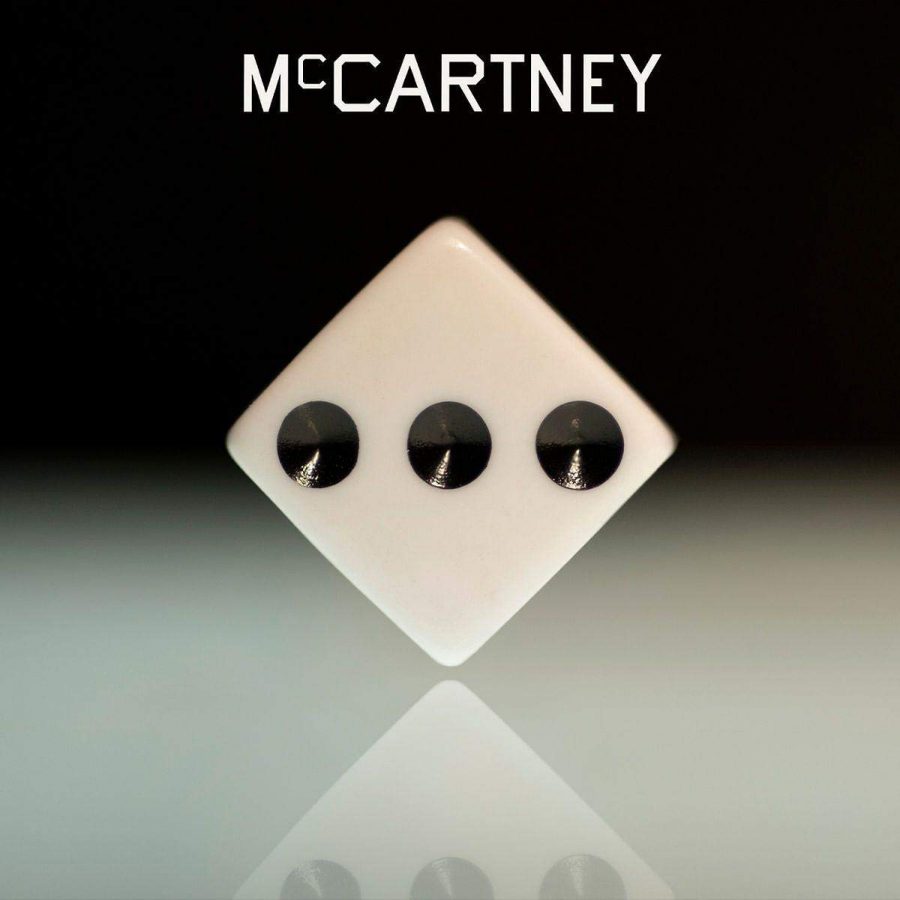“McCartney III” is the legendary Beatle at his purest form
Get lost in the vibes of Paul McCartney’s third solo album.
February 5, 2021
What do you do after a long career defining and redefining popular music with each new album? Well apparently, you just never stop.
50 years after the breakup of The Beatles, arguably the most influential music act of the 20th century, Paul McCartney is back with another self-titled album. “McCartney III” is, well, the third in McCartney’s series of completely self-made albums, where he plays every single instrument, sings all the vocals and, of course, writes all the songs. The first two “McCartney” albums came at times of great tumult in the titular musician’s life, with the first coming out in 1970 right after The Beatles broke up, and the second in 1980 after the breakup of the Wings, McCartney’s touring band post-Beatles.
While none of McCartney’s solo work has ever demonstrated the same level of quality as what he did with the Beatles, “McCartney” and “McCartney II” were particularly reviled by critics at the time of their release. Both albums were criticized as being incredibly self-indulgent and more interested in noodling out tunes rather than the iconic ballads and intricate melodies the Beatles were known for, but recent reappraisals have been much kinder. The sheer simplicity and lack of production of the first “McCartney” has been said to be formative in the development of indie music, and the wacky synth-filled “McCartney II” is now seen as a direct predecessor of the electropop and lo-fi beats many modern pop musicians use today.
Indeed, it must have been quite a break from what fans expected from a Paul McCartney production, but both albums exemplified McCartney at his purest: an experimenter and a songwriter. In the end, you didn’t need John Lennon harmonies or George Harrison guitar solos to still make classic songs. McCartney could do it all by himself, and was defiant in doing so.
While no band broke up in 2020, McCartney had a lot of time to himself like before, and once again started noodling around, looking at past unreleased songs and fiddling with other melodies running through his mind during lockdown, or “rockdown” as McCartney has been calling it. While quarantining on his sheep farm, McCartney was busy layering tracks to build melodies, having apparently no idea he was actually making another album. He had just released his last album, “Egypt Station,” in 2018, which was his attempt to chase the pop rock trends of the time.
However, with “McCartney III,” we see a musician free from the constraints of expectations and now simply making music for music’s sake. In this process of just churning out tunes by himself and adding instruments along gradually, McCartney provides his most indulgent and free-wheeling album yet. And unlike previous albums in the “McCartney” series, McCartney has absolutely nothing to prove, and it shows.
The album starts with the seemingly Celtic-inspired “Long Tailed Winter Bird,” repeating the same guitar riff over and over as it builds, with McCartney intermittently taunting the listener, asking if they missed him. This continues for five whole minutes, making for a track that perfectly represents the entire album—self-indulgent and self-aware.
As the album goes on, we get riffs of his Beatles work with songs like “Lavatory Lil,” which seems to be a meaner take on the “Abbey Road” track “Polythene Pam,” softer moments with McCartney just strumming his guitar and crooning along like “Kiss of Venus,” hard rockers like “Slidin’” and grooved out sex-exuding tracks like “Deep Down.” References to Paul’s 2020 state of mind could be found in songs like “Find My Way” and “Seize the Day,” portraying a man full of anxieties always trying to find the right path forward. The whole album seems like McCartney’s career condensed into one record, but with the music emancipated from previous pressures.
The true centerpiece of the album, however, is “Deep Deep Feeling,” an eight-minute track that simultaneously is way too long and could be way longer. The confusion that love creates is recreated in the swirling instrumentation that is cyclically constructed and deconstructed. Love can create a zone that you’re in, a feeling that you don’t want to end, and likewise the track is one McCartney wishes he could keep playing. As he says in the song, “Sometimes I wish it would stay/Sometimes I wish it would go away/Emotion.”
It all wraps up with a return to McCartney’s pastoral roots, with tropes that he perfected in his “RAM” period, telling the story of a farming family’s day and relaying a sense of collective community and wellbeing. The best McCartney songs are often just him on a guitar, from “Yesterday,” to “I’ll Follow the Sun,” to “Blackbird,” and “When Winter Comes” carries on that legacy. In a strange nostalgic twist, McCartney’s vocals are from a session from the ‘90s, making the track almost an act of time travel, showcasing his vocal chords unmarred by strain and age. While McCartney’s voice is still strong today, hearing the contrast between his youth and his current state is quite jarring and saddening, but somehow still reassuring. Paul’s voice may fade, but his songs remain strong.
Nothing lasts forever, but this album shows McCartney’s music will endure.




